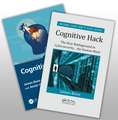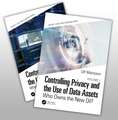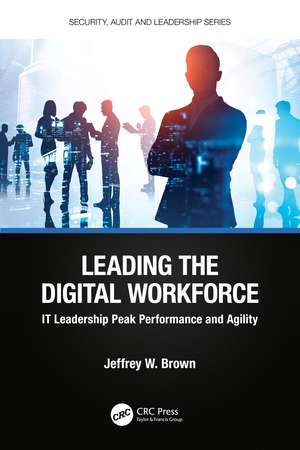Leading the Digital Workforce: IT Leadership Peak Performance and Agility: Security, Audit and Leadership Series
Autor Jeffrey W. Brownen Limba Engleză Hardback – 19 iun 2023
Leading the Digital Workforce provides strategies for empowering people, optimizing processes, and inspiring innovation. This book offers insights into managing change, leveraging technology, and building strong relationships within your organization, including how to understand and work with company culture. Finally, it shares strategies for using technology and innovation to create a competitive edge to unlock new opportunities.
Leading the Digital Workforce is essential reading for IT leaders who want to develop their skills, stay ahead of the digital curve, and lead their organizations into the future. No matter if you’re a new IT leader, an aspiring one, or a seasoned leader who’s been at it for years, there’s something in this book that will help you level up your game.
| Toate formatele și edițiile | Preț | Express |
|---|---|---|
| Paperback (1) | 332.31 lei 6-8 săpt. | |
| CRC Press – 19 iun 2023 | 332.31 lei 6-8 săpt. | |
| Hardback (1) | 731.65 lei 6-8 săpt. | |
| CRC Press – 19 iun 2023 | 731.65 lei 6-8 săpt. |
Din seria Security, Audit and Leadership Series
- 20%
 Preț: 246.63 lei
Preț: 246.63 lei -
 Preț: 347.16 lei
Preț: 347.16 lei - 20%
 Preț: 323.24 lei
Preț: 323.24 lei - 20%
 Preț: 430.33 lei
Preț: 430.33 lei - 20%
 Preț: 316.05 lei
Preț: 316.05 lei - 20%
 Preț: 347.59 lei
Preț: 347.59 lei - 20%
 Preț: 545.21 lei
Preț: 545.21 lei - 20%
 Preț: 167.22 lei
Preț: 167.22 lei - 20%
 Preț: 317.29 lei
Preț: 317.29 lei - 20%
 Preț: 298.56 lei
Preț: 298.56 lei -
 Preț: 348.10 lei
Preț: 348.10 lei - 20%
 Preț: 260.09 lei
Preț: 260.09 lei - 20%
 Preț: 300.36 lei
Preț: 300.36 lei - 20%
 Preț: 415.62 lei
Preț: 415.62 lei - 20%
 Preț: 266.51 lei
Preț: 266.51 lei - 8%
 Preț: 474.66 lei
Preț: 474.66 lei - 20%
 Preț: 396.30 lei
Preț: 396.30 lei - 20%
 Preț: 289.74 lei
Preț: 289.74 lei - 20%
 Preț: 297.34 lei
Preț: 297.34 lei - 20%
 Preț: 319.45 lei
Preț: 319.45 lei - 20%
 Preț: 176.97 lei
Preț: 176.97 lei - 20%
 Preț: 316.83 lei
Preț: 316.83 lei - 20%
 Preț: 316.59 lei
Preț: 316.59 lei -
 Preț: 274.03 lei
Preț: 274.03 lei - 20%
 Preț: 233.85 lei
Preț: 233.85 lei - 20%
 Preț: 875.81 lei
Preț: 875.81 lei - 30%
 Preț: 261.35 lei
Preț: 261.35 lei - 31%
 Preț: 340.53 lei
Preț: 340.53 lei - 20%
 Preț: 264.17 lei
Preț: 264.17 lei - 20%
 Preț: 936.95 lei
Preț: 936.95 lei - 20%
 Preț: 482.57 lei
Preț: 482.57 lei - 20%
 Preț: 413.14 lei
Preț: 413.14 lei - 20%
 Preț: 234.33 lei
Preț: 234.33 lei - 20%
 Preț: 516.60 lei
Preț: 516.60 lei - 20%
 Preț: 513.00 lei
Preț: 513.00 lei - 31%
 Preț: 731.18 lei
Preț: 731.18 lei - 20%
 Preț: 1281.72 lei
Preț: 1281.72 lei - 20%
 Preț: 232.82 lei
Preț: 232.82 lei - 20%
 Preț: 479.27 lei
Preț: 479.27 lei - 20%
 Preț: 262.44 lei
Preț: 262.44 lei - 20%
 Preț: 293.27 lei
Preț: 293.27 lei - 20%
 Preț: 759.26 lei
Preț: 759.26 lei - 34%
 Preț: 216.03 lei
Preț: 216.03 lei - 20%
 Preț: 457.75 lei
Preț: 457.75 lei
Preț: 731.65 lei
Preț vechi: 892.26 lei
-18% Nou
Puncte Express: 1097
Preț estimativ în valută:
140.01€ • 145.35$ • 116.75£
140.01€ • 145.35$ • 116.75£
Carte tipărită la comandă
Livrare economică 22 martie-05 aprilie
Preluare comenzi: 021 569.72.76
Specificații
ISBN-13: 9781032323725
ISBN-10: 1032323728
Pagini: 220
Ilustrații: 25 Line drawings, black and white; 10 Halftones, black and white; 35 Illustrations, black and white
Dimensiuni: 156 x 234 x 14 mm
Greutate: 0.57 kg
Ediția:1
Editura: CRC Press
Colecția CRC Press
Seria Security, Audit and Leadership Series
Locul publicării:Boca Raton, United States
ISBN-10: 1032323728
Pagini: 220
Ilustrații: 25 Line drawings, black and white; 10 Halftones, black and white; 35 Illustrations, black and white
Dimensiuni: 156 x 234 x 14 mm
Greutate: 0.57 kg
Ediția:1
Editura: CRC Press
Colecția CRC Press
Seria Security, Audit and Leadership Series
Locul publicării:Boca Raton, United States
Public țintă
ProfessionalNotă biografică
Jeffrey W. Brown, CISSP-ISSMP, CRISC, CISM, PMP is the first Chief Information Security Officer (CISO) for the State of Connecticut. The Center for Digital Government recently gave national recognition to Connecticut for leadership and collaboration by ranking it third in the nation. Jeff is a recognized information security and IT risk expert with a strong track record of over two decades implementing cost-effective controls for global Fortune 500 financial institutions including Merrill Lynch, Goldman Sachs, Citigroup, GE Capital, BNY Mellon and AIG. He is a two-time winner of CISOs Connect™ Top 100 CISOs (C100).
Jeff worked briefly in the publishing industry as an editor for HarperCollins before pursuing his passion for technology full time. While at HarperCollins he set up the College division’s first web presence and was involved helping plan distance learning programs, a relatively new concept back in 1995. He never strayed far from these roots and has since gone on to co-author the Web Publisher’s Deign Guide for Windows (Coriolis, 1993) and Mission Critical Internet Security (Syngress, 2000) and is the author of The Security Leader’s Communication Playbook (CRC Press, 2001).
Jeff is a frequent speaker at events and conferences and is a co-Chair of Evanta’s New York CISO Executive Summit events. He is a board advisor for Cowbell Cyber, iQ4 and the University of New Haven/Connecticut Institute of Technology. In his free time, he enjoys hiking, writing, playing guitar and spending time with his wife and English Springer Spaniel, Gracie. He holds multiple industry certifications, a BA in Journalism and an MS in Publishing from Pace University as well as a certificate in Cybersecurity from Ithaca College, where he serves as an advisor for the program.
Jeff worked briefly in the publishing industry as an editor for HarperCollins before pursuing his passion for technology full time. While at HarperCollins he set up the College division’s first web presence and was involved helping plan distance learning programs, a relatively new concept back in 1995. He never strayed far from these roots and has since gone on to co-author the Web Publisher’s Deign Guide for Windows (Coriolis, 1993) and Mission Critical Internet Security (Syngress, 2000) and is the author of The Security Leader’s Communication Playbook (CRC Press, 2001).
Jeff is a frequent speaker at events and conferences and is a co-Chair of Evanta’s New York CISO Executive Summit events. He is a board advisor for Cowbell Cyber, iQ4 and the University of New Haven/Connecticut Institute of Technology. In his free time, he enjoys hiking, writing, playing guitar and spending time with his wife and English Springer Spaniel, Gracie. He holds multiple industry certifications, a BA in Journalism and an MS in Publishing from Pace University as well as a certificate in Cybersecurity from Ithaca College, where he serves as an advisor for the program.
Cuprins
Preface
Acknowledgements
About the Author
Part 1: Foundations
Chapter 1 Playing the long game of leadership
Chapter 2: The average IT leader is…average
Chapter 3 Master your mindset
Chapter 4 IT leadership peak performance
Part 2: Leadership in action
Chapter 5 Starting a new job: How to thrive
Chapter 6 A crash course in strategic planning
Chapter 7 Building a high-performance team
Chapter 8 Execution and getting things done
Chapter 9 Leading from anywhere: A guide to the hybrid office
Chapter 10 Giving back: Industry leadership and the next generation of leaders
Chapter 11 Leading from the edge: The future of work
Conclusion
Appendix
Acknowledgements
About the Author
Part 1: Foundations
Chapter 1 Playing the long game of leadership
Chapter 2: The average IT leader is…average
Chapter 3 Master your mindset
Chapter 4 IT leadership peak performance
Part 2: Leadership in action
Chapter 5 Starting a new job: How to thrive
Chapter 6 A crash course in strategic planning
Chapter 7 Building a high-performance team
Chapter 8 Execution and getting things done
Chapter 9 Leading from anywhere: A guide to the hybrid office
Chapter 10 Giving back: Industry leadership and the next generation of leaders
Chapter 11 Leading from the edge: The future of work
Conclusion
Appendix
Recenzii
Leading the Digital Workforce, focuses on being and becoming a leader. One of the core principles that many organizations I have worked with struggle with is who should be a leader. Some people truly are not cut out to be a leader. They need to gain the skills outlined in this book. These include mastering your mindset, managing emotions, and other foundational skills to help you become a leader. The author argues that anyone can improve their leadership skills and that great leaders are not necessarily born that way. For me, the concept of mastering your emotions resonated. Over the years of my career, I have found some of the skills listed in this book, including managing your emotions and mastering your mindset, to be useful tools.
The component or one part of the book that, in considering this book, stands out for me beyond the tools given early in the book is the concepts of worthy leaders that are incredibly useful. The first is one that I haven't seen often and that I find incredibly insightful—simply determining whether one can and should be a leader. Leaders and managers are different, but we must ask ourselves if we have the skills for a leadership role. Leaders have to find a voice that this book will help them hone. As the "employee," you must want to follow that leader. The second component that resonated with me is the concept of becoming the leader people to follow. So the first part is to ask yourself, should you be a leader? Am I ready to be a leader? The second part is combining the book and becoming a leader worth following.
Finally, we come to something new for me in this work—the six leadership styles. The six leadership styles based on Daniel Goleman's model are autocratic, visionary, affiliative, democratic, pacesetting, and coaching. It advises readers to adapt their style to the situation and the needs of their team. The concepts of each leadership style and applying the "right" style at the "right" time are valuable. First, as a team concept, knowing what style the leader is in at that time helps you navigate your day-to-day role. But as a leader, knowing what your style is natively allows you to move into the style your team needs. To borrow from an adage, when you are up to your neck alligators, it is not the time to question your leader.
All in all, I highly recommend the book Leading the Digital Workforce. It has helped me refine my views of leaders and leadership and better understand how I impact as a leader and how the leaders I work for impact me!
- Scott Andersen
"Leading the Digital Workforce" by Jeffrey W. Brown is an essential guide for IT leaders navigating the rapidly evolving digital landscape. Brown's book emphasizes that future technology leaders will be business leaders with a deep understanding of technology rather than traditional tech experts. The author provides a comprehensive roadmap for building personal resilience, avoiding burnout, and creating strategies to lead high-performance teams. The book stands out by addressing the unique challenges of technology leadership and offering actionable advice to foster a culture of innovation and drive successful change initiatives.
The book divides into two main sections: Foundations and Leadership in Action. The Foundations section lays the groundwork by discussing key aspects such as mastering your mindset, managing emotions, and understanding the impact of poor leadership. Brown highlights the importance of creating psychological safety, managing conflict, and leading through crises. The Leadership in Action section delves into practical strategies for building high-performance teams, executing plans effectively, and thriving in a hybrid work environment. This structure ensures that readers understand the theoretical aspects of leadership and learn how to apply these principles in real-world scenarios.
Overall, "Leading the Digital Workforce" is a must-read for IT professionals looking to enhance their leadership skills and navigate the complexities of today's digital workplace. Brown's blend of theoretical insights and practical strategies makes this book a comprehensive guide for anyone aspiring to lead in technology. Whether you are an aspiring leader or an experienced executive, this book offers valuable lessons and tools to help you succeed in a rapidly changing environment
- Tim Godlove, Ph.D.
“In an era where digital transformation is not just a buzzword but a critical pivot for survival and success, Jeffrey W. Brown's "Leading the Digital Workforce: IT Leadership Peak Performance and Agility" emerges as a beacon for current and aspiring IT leaders. This book is a masterclass in navigating the complex terrain of technology leadership, offering a pragmatic approach to fostering innovation, driving change, and building high-performance teams.
Brown's work is a testament to the power of resilience and strategic agility in the face of rapid technological change. His insights on personal resiliency, avoiding burnout, and creating a culture of innovation are invaluable for anyone looking to thrive in today's digital workplace. The book's unique blend of hard-hitting truths and actionable strategies provides a roadmap for IT professionals to elevate their leadership game and steer their organizations towards a future brimming with possibilities.
For those grappling with the challenges of hybrid office environments or seeking to master strategic planning, Brown's guidance is akin to finding the leadership 'cheat code' for the digital age. His hands-on experience and management frameworks equip leaders with the tools to make swift, informed decisions that can transform average performers into a high-performing team.
As we look towards the horizon of work and technology trends, "Leading the Digital Workforce" stands out not only for its content but for its compelling delivery. Each chapter concludes with a powerful summary, excellent references for future reading and actionable steps that challenge readers to step up and make a tangible impact. Brown doesn't just share knowledge; he dares you to apply it and join the ranks of those leading from the edge.
For IT professionals committed to continuous growth and excellence, this book is an essential addition to your library. It's a clarion call to embrace the mindset and habits that will shape the future of IT leadership and, by extension, the digital workforce of tomorrow. As we look towards the future of work and the evolving role of technology, Brown's insights are more than just timely—they are indispensable. This book is a call to arms for IT leaders to step up, innovate, and lead their organizations into a new era of digital excellence.”
Gary Craven, I.S.P., FCMC, ITCP
The author has done an excellent job of differentiating technology leadership from other types. In the introduction, he states, "Great leadership is a process, not an outcome." A statement that sets the tone for the rest of the book. His premise is that since the world and technology change daily, you must also evolve if you are to be successful. He highlights actions you should take to help you think about your leadership journey
One of my favorite parts of the book was Chapter 2, where the author lists ten questions you should ask yourself to ensure you want to become a technology manager. Any person contemplating a management move should read this chapter and carefully analyze their responses. The author has a good grasp on what it takes to be a well-rounded, competent manager and helps you do an honest assessment of your skills and motivation.
The book does a great job of describing the expected duties and skills you will need to be a manager. It is full of practical advice and examples on how to handle different scenarios you will. Face. Personally, I would have loved to have a book like this as a reference for my career. I’m sure it would have been well used and full of bookmarks and notes.
Gene Fredriksen
Leading the Digital Workforce by Jeffrey W. Brown is a game-changer for anyone trying to make sense of leadership in the tech world. Jeff dives right into what it means to lead today, making it clear this isn’t just another book filled with unreachable ideals. It's real talk about real challenges, like how to keep your cool when everything tech is constantly shifting under your feet. He doesn’t just ask if leaders are born or made; he shows us how anyone can step up their game, equipped with the right mindset and frameworks explained throughout the book. I especially enjoyed how each chapter felt like it was speaking directly to me, giving me the nudge I needed sometimes to think differently about how I lead my team.
This book doesn't just throw concepts at you; it walks you through how to actually apply them, whether you're trying to figure out how to hold your team together building psychological safety or navigate the after our reality of hybrid work. Reading about building a high-performance team and mastering execution felt like Jeff was handing over the secret sauce to leading effectively in IT. And when he talks about the future of work, it’s not doom and gloom but emphasizing creativity and adaptability, not only prepared us for upcoming challenges but also encouraging us for leading through change. It’s a pep talk for what’s possible if we’re ready to evolve. For me, Leading the Digital Workforce has been a breath of fresh air and helped reviving valuable concepts and strategies I'd shelved over time, full of pragmatic wisdom that’s already making me rethink how my team and I consciously approach leadership.
It’s a must-read for anyone in IT who wants to lead with confidence in this rapidly changing world.
Carlos Morales
Technology leadership has emerged as a response to the ever-evolving needs of the digital age. Brown’s Leading the Digital Workforce is a well-timed, to the purpose, in depth book on a relatively new but still opaque notion of digitalization and the interconnected digital workforce and technology. The book introduces rising digital workforce and IT leadership as the new underlying digital age phenomena. It touches upon an extensive literature and market research over leadership and digital technologies.
Leadership is (for the most part) a personal journey, surely. And learning to be a great leader is a continuous process too. Technology leadership is even more complex, uncertain and volatile. Brown’s Leading the Digital Workforce examines the future of work, and how technology is expected to transform the workplaces. The book elaborates on gaining a future IT leader mindset and embracing habits of future digital leaders. Leading the Digital Workforce focuses on creation of a new era technology leadership for the current and future IT leaders. The book provides insights on how to lead a high-performing team, and strategies to build personal resilience against the complexities of the digital age, as well as ways to improve leadership skills. Mastering your mindset and managing emotions as well as other foundational skills are emphasized to be cultivated, to become an aspiring IT leader.
Practical suggestions regarding how to achieve successful transformation and create an innovation culture are listed across the book. Key strategies or actions for a successful transformation, creation of a new company culture, ways to utilize technology and promote a change culture are listed alongside. The book provides strategies and new approaches to foster innovation, creativity, collaboration, insights into effectively utilizing technology and innovations to render possible new opportunities. It prioritizes empowering the labor force, helping digital workforce develop new skills and hence elevating new era leadership skills.
"Leading the Digital Workforce" by Jeffrey W. Brown consists of two comprehensive sections. Together, the two sections lead readers to better comprehend the new digital world, and theoretical aspects of leadership as well as learning how to apply these principles in real-world scenarios. The book accommodates a well-organized approach to deliver key lessons. End of chapter summaries, concrete steps and roadmap to act and extensive further reading lists to deep dive into in details are invaluable. Real world implications, practical experiments are facilitated via end of section actions lists.
Practical strategies or actions for new generation technology leadership makes this book a comprehensive guide for anyone aspiring to lead in technology. Simple (yet secret) leadership codes for the digital age are served on a silver platter. The book is highly recommended for experts, executives, business and technology professionals and IT leaders interested in digitalization, technology and leadership.
- Bilal Bagis, Assoc. Prof. of Economics, FSMVU
After reading that book I can say that, Leading the Digital Workforce is a timely and insightful guide for IT leaders grappling with the complexities of today's rapidly evolving digital landscape. In this first edition, Brown underscores the need for a new leadership paradigm that transcends traditional models, honing in on agility, resilience, and the unique challenges technology professionals face. The book is not just a theoretical guide but a practical resource that is highly relevant to the current digital landscape. It is structured into foundational concepts and actionable strategies, equipping readers with both the theory and practical tools necessary to excel as leaders. Brown’s exploration of leadership mindset, strategic planning, and building high-performance teams is particularly valuable, as it directly addresses the challenges IT leaders confront in an environment where innovation is paramount and disruption is a constant. This emphasis on the current digital landscape will leave you feeling informed and up-to-date, ensuring you are well-prepared for the challenges ahead.
One of the book's most compelling aspects is its emphasis on the human side of leadership within the digital workforce. Brown addresses the importance of fostering trust, integrity, and psychological safety among teams while managing personal issues like stress, burnout, and imposter syndrome. He highlights the delicate balance between emotional intelligence and technical expertise, reminding readers that the best leaders can connect with their teams while still driving performance. The book's focus on the human side of leadership provides a unique approach to leadership that can significantly impact the performance and well-being of IT teams. Including practical frameworks such as the OODA loop and tips for strategic planning provides clear guidance for managing everyday tasks and long-term goals.
Leading the Digital Workforce also examines how technology like AI, machine learning, and 5G will reshape the future of work and the role of IT leaders. Brown argues that future IT leaders must be business-savvy individuals who can bridge the gap between technology and organizational objectives. By integrating future trends and current leadership practices, Brown’s book is essential reading for both seasoned IT professionals and aspiring leaders. His actionable insights and focus on personal development make this book not just a leadership manual but a source of inspiration and a roadmap for long-term success in the ever-changing digital era. It motivates readers to invest in their personal growth and development, knowing that it is critical to their long-term success. This focus on personal development will leave you feeling inspired and motivated, ready to take on the challenges of the digital era with renewed energy and determination.
- Dr. Sunil Kumar, Associate Professor, HOD, M.Com, Faculty of Management and Commerce, ICFAI University Tripura, India
The component or one part of the book that, in considering this book, stands out for me beyond the tools given early in the book is the concepts of worthy leaders that are incredibly useful. The first is one that I haven't seen often and that I find incredibly insightful—simply determining whether one can and should be a leader. Leaders and managers are different, but we must ask ourselves if we have the skills for a leadership role. Leaders have to find a voice that this book will help them hone. As the "employee," you must want to follow that leader. The second component that resonated with me is the concept of becoming the leader people to follow. So the first part is to ask yourself, should you be a leader? Am I ready to be a leader? The second part is combining the book and becoming a leader worth following.
Finally, we come to something new for me in this work—the six leadership styles. The six leadership styles based on Daniel Goleman's model are autocratic, visionary, affiliative, democratic, pacesetting, and coaching. It advises readers to adapt their style to the situation and the needs of their team. The concepts of each leadership style and applying the "right" style at the "right" time are valuable. First, as a team concept, knowing what style the leader is in at that time helps you navigate your day-to-day role. But as a leader, knowing what your style is natively allows you to move into the style your team needs. To borrow from an adage, when you are up to your neck alligators, it is not the time to question your leader.
All in all, I highly recommend the book Leading the Digital Workforce. It has helped me refine my views of leaders and leadership and better understand how I impact as a leader and how the leaders I work for impact me!
- Scott Andersen
"Leading the Digital Workforce" by Jeffrey W. Brown is an essential guide for IT leaders navigating the rapidly evolving digital landscape. Brown's book emphasizes that future technology leaders will be business leaders with a deep understanding of technology rather than traditional tech experts. The author provides a comprehensive roadmap for building personal resilience, avoiding burnout, and creating strategies to lead high-performance teams. The book stands out by addressing the unique challenges of technology leadership and offering actionable advice to foster a culture of innovation and drive successful change initiatives.
The book divides into two main sections: Foundations and Leadership in Action. The Foundations section lays the groundwork by discussing key aspects such as mastering your mindset, managing emotions, and understanding the impact of poor leadership. Brown highlights the importance of creating psychological safety, managing conflict, and leading through crises. The Leadership in Action section delves into practical strategies for building high-performance teams, executing plans effectively, and thriving in a hybrid work environment. This structure ensures that readers understand the theoretical aspects of leadership and learn how to apply these principles in real-world scenarios.
Overall, "Leading the Digital Workforce" is a must-read for IT professionals looking to enhance their leadership skills and navigate the complexities of today's digital workplace. Brown's blend of theoretical insights and practical strategies makes this book a comprehensive guide for anyone aspiring to lead in technology. Whether you are an aspiring leader or an experienced executive, this book offers valuable lessons and tools to help you succeed in a rapidly changing environment
- Tim Godlove, Ph.D.
“In an era where digital transformation is not just a buzzword but a critical pivot for survival and success, Jeffrey W. Brown's "Leading the Digital Workforce: IT Leadership Peak Performance and Agility" emerges as a beacon for current and aspiring IT leaders. This book is a masterclass in navigating the complex terrain of technology leadership, offering a pragmatic approach to fostering innovation, driving change, and building high-performance teams.
Brown's work is a testament to the power of resilience and strategic agility in the face of rapid technological change. His insights on personal resiliency, avoiding burnout, and creating a culture of innovation are invaluable for anyone looking to thrive in today's digital workplace. The book's unique blend of hard-hitting truths and actionable strategies provides a roadmap for IT professionals to elevate their leadership game and steer their organizations towards a future brimming with possibilities.
For those grappling with the challenges of hybrid office environments or seeking to master strategic planning, Brown's guidance is akin to finding the leadership 'cheat code' for the digital age. His hands-on experience and management frameworks equip leaders with the tools to make swift, informed decisions that can transform average performers into a high-performing team.
As we look towards the horizon of work and technology trends, "Leading the Digital Workforce" stands out not only for its content but for its compelling delivery. Each chapter concludes with a powerful summary, excellent references for future reading and actionable steps that challenge readers to step up and make a tangible impact. Brown doesn't just share knowledge; he dares you to apply it and join the ranks of those leading from the edge.
For IT professionals committed to continuous growth and excellence, this book is an essential addition to your library. It's a clarion call to embrace the mindset and habits that will shape the future of IT leadership and, by extension, the digital workforce of tomorrow. As we look towards the future of work and the evolving role of technology, Brown's insights are more than just timely—they are indispensable. This book is a call to arms for IT leaders to step up, innovate, and lead their organizations into a new era of digital excellence.”
Gary Craven, I.S.P., FCMC, ITCP
The author has done an excellent job of differentiating technology leadership from other types. In the introduction, he states, "Great leadership is a process, not an outcome." A statement that sets the tone for the rest of the book. His premise is that since the world and technology change daily, you must also evolve if you are to be successful. He highlights actions you should take to help you think about your leadership journey
One of my favorite parts of the book was Chapter 2, where the author lists ten questions you should ask yourself to ensure you want to become a technology manager. Any person contemplating a management move should read this chapter and carefully analyze their responses. The author has a good grasp on what it takes to be a well-rounded, competent manager and helps you do an honest assessment of your skills and motivation.
The book does a great job of describing the expected duties and skills you will need to be a manager. It is full of practical advice and examples on how to handle different scenarios you will. Face. Personally, I would have loved to have a book like this as a reference for my career. I’m sure it would have been well used and full of bookmarks and notes.
Gene Fredriksen
Leading the Digital Workforce by Jeffrey W. Brown is a game-changer for anyone trying to make sense of leadership in the tech world. Jeff dives right into what it means to lead today, making it clear this isn’t just another book filled with unreachable ideals. It's real talk about real challenges, like how to keep your cool when everything tech is constantly shifting under your feet. He doesn’t just ask if leaders are born or made; he shows us how anyone can step up their game, equipped with the right mindset and frameworks explained throughout the book. I especially enjoyed how each chapter felt like it was speaking directly to me, giving me the nudge I needed sometimes to think differently about how I lead my team.
This book doesn't just throw concepts at you; it walks you through how to actually apply them, whether you're trying to figure out how to hold your team together building psychological safety or navigate the after our reality of hybrid work. Reading about building a high-performance team and mastering execution felt like Jeff was handing over the secret sauce to leading effectively in IT. And when he talks about the future of work, it’s not doom and gloom but emphasizing creativity and adaptability, not only prepared us for upcoming challenges but also encouraging us for leading through change. It’s a pep talk for what’s possible if we’re ready to evolve. For me, Leading the Digital Workforce has been a breath of fresh air and helped reviving valuable concepts and strategies I'd shelved over time, full of pragmatic wisdom that’s already making me rethink how my team and I consciously approach leadership.
It’s a must-read for anyone in IT who wants to lead with confidence in this rapidly changing world.
Carlos Morales
Technology leadership has emerged as a response to the ever-evolving needs of the digital age. Brown’s Leading the Digital Workforce is a well-timed, to the purpose, in depth book on a relatively new but still opaque notion of digitalization and the interconnected digital workforce and technology. The book introduces rising digital workforce and IT leadership as the new underlying digital age phenomena. It touches upon an extensive literature and market research over leadership and digital technologies.
Leadership is (for the most part) a personal journey, surely. And learning to be a great leader is a continuous process too. Technology leadership is even more complex, uncertain and volatile. Brown’s Leading the Digital Workforce examines the future of work, and how technology is expected to transform the workplaces. The book elaborates on gaining a future IT leader mindset and embracing habits of future digital leaders. Leading the Digital Workforce focuses on creation of a new era technology leadership for the current and future IT leaders. The book provides insights on how to lead a high-performing team, and strategies to build personal resilience against the complexities of the digital age, as well as ways to improve leadership skills. Mastering your mindset and managing emotions as well as other foundational skills are emphasized to be cultivated, to become an aspiring IT leader.
Practical suggestions regarding how to achieve successful transformation and create an innovation culture are listed across the book. Key strategies or actions for a successful transformation, creation of a new company culture, ways to utilize technology and promote a change culture are listed alongside. The book provides strategies and new approaches to foster innovation, creativity, collaboration, insights into effectively utilizing technology and innovations to render possible new opportunities. It prioritizes empowering the labor force, helping digital workforce develop new skills and hence elevating new era leadership skills.
"Leading the Digital Workforce" by Jeffrey W. Brown consists of two comprehensive sections. Together, the two sections lead readers to better comprehend the new digital world, and theoretical aspects of leadership as well as learning how to apply these principles in real-world scenarios. The book accommodates a well-organized approach to deliver key lessons. End of chapter summaries, concrete steps and roadmap to act and extensive further reading lists to deep dive into in details are invaluable. Real world implications, practical experiments are facilitated via end of section actions lists.
Practical strategies or actions for new generation technology leadership makes this book a comprehensive guide for anyone aspiring to lead in technology. Simple (yet secret) leadership codes for the digital age are served on a silver platter. The book is highly recommended for experts, executives, business and technology professionals and IT leaders interested in digitalization, technology and leadership.
- Bilal Bagis, Assoc. Prof. of Economics, FSMVU
After reading that book I can say that, Leading the Digital Workforce is a timely and insightful guide for IT leaders grappling with the complexities of today's rapidly evolving digital landscape. In this first edition, Brown underscores the need for a new leadership paradigm that transcends traditional models, honing in on agility, resilience, and the unique challenges technology professionals face. The book is not just a theoretical guide but a practical resource that is highly relevant to the current digital landscape. It is structured into foundational concepts and actionable strategies, equipping readers with both the theory and practical tools necessary to excel as leaders. Brown’s exploration of leadership mindset, strategic planning, and building high-performance teams is particularly valuable, as it directly addresses the challenges IT leaders confront in an environment where innovation is paramount and disruption is a constant. This emphasis on the current digital landscape will leave you feeling informed and up-to-date, ensuring you are well-prepared for the challenges ahead.
One of the book's most compelling aspects is its emphasis on the human side of leadership within the digital workforce. Brown addresses the importance of fostering trust, integrity, and psychological safety among teams while managing personal issues like stress, burnout, and imposter syndrome. He highlights the delicate balance between emotional intelligence and technical expertise, reminding readers that the best leaders can connect with their teams while still driving performance. The book's focus on the human side of leadership provides a unique approach to leadership that can significantly impact the performance and well-being of IT teams. Including practical frameworks such as the OODA loop and tips for strategic planning provides clear guidance for managing everyday tasks and long-term goals.
Leading the Digital Workforce also examines how technology like AI, machine learning, and 5G will reshape the future of work and the role of IT leaders. Brown argues that future IT leaders must be business-savvy individuals who can bridge the gap between technology and organizational objectives. By integrating future trends and current leadership practices, Brown’s book is essential reading for both seasoned IT professionals and aspiring leaders. His actionable insights and focus on personal development make this book not just a leadership manual but a source of inspiration and a roadmap for long-term success in the ever-changing digital era. It motivates readers to invest in their personal growth and development, knowing that it is critical to their long-term success. This focus on personal development will leave you feeling inspired and motivated, ready to take on the challenges of the digital era with renewed energy and determination.
- Dr. Sunil Kumar, Associate Professor, HOD, M.Com, Faculty of Management and Commerce, ICFAI University Tripura, India
Descriere
This book offers insights into managing change, leveraging technology and building strong relationships within your organization including how to understand and work with company culture. It is an essential reading for IT leaders who want to develop their skills, stay ahead of the digital curve and lead their organizations into the future.













